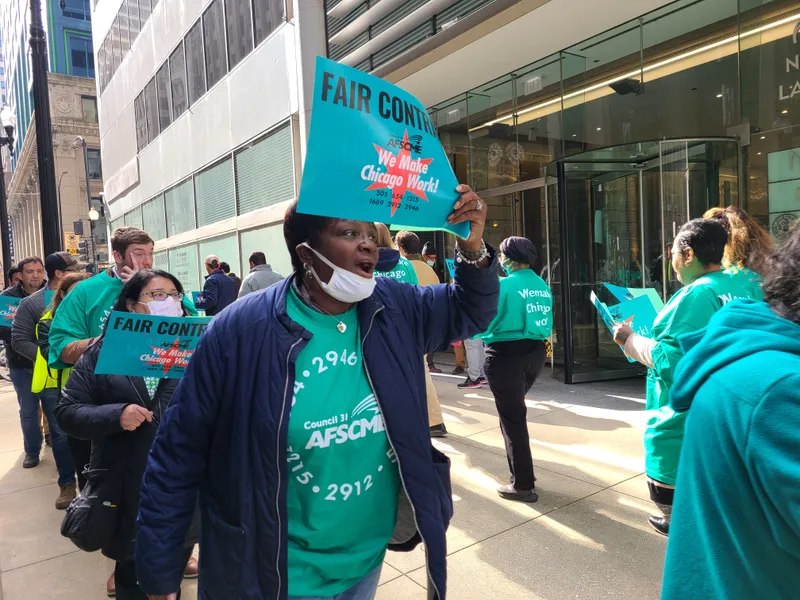
(WBBM NEWSRADIO) — The Illinois Constitution has been amended 14 times since it went into effect in 1971.
Depending on how Illinois residents vote in the 2022 midterm elections, a 15th amendment — the so-called Workers’ Rights Amendment (WRA) — could be on the way.
Below is a look at what’s inside of the proposed amendment, why its constitutional status matters, as well as arguments for and against the WRA.
The new constitutional proposal says, in part, that “employees shall have the fundamental right to organize and bargain collectively through representatives of their own choosing for the purposes of negotiating wages, hours and working conditions.”
In other words, it would guarantee the right for workers to unionize.
“Putting rights in the constitution, which is what happened in Europe, for instance, is a much more secure right,” Northern Illinois University History Professor Rosemary Feurer said. “It’s very hard to take it away once won.”
Feurer believes it’s really innovative that the proposal is being made now.
“Years ago, perhaps when the labor movement was strong, they should have done this,” Feurer said. “They rested on their laurels and, I think, the timing comes at a time of reduced worker power.”
That’s not to say the amendment will mean all workers will end up being in unions.
“It doesn’t automatically mean workers are going to organize,” Feurer said. “They still have to persuade their fellow members that they are going to be better off.”
Feurer thinks that if the Worker’s Rights Amendment proposal passes in Illinois, then other states will try to do the same with their constitutions.
In Illinois, one local law professor — who was a legal researcher at the state’s 1970 constitutional convention — said she believes the failed attempt by former Gov. Bruce Rauner to establish local “empowerment zones” is a reason supporters want to codify protection against such laws.
“It’s a judgment call as to whether you think the danger would be so great in the next 20 or 30 years that we should put this into the Illinois Constitution,” said Ann Lousin, a law professor at the University of Illinois-Chicago.
The Republican governor did succeed in filing a lawsuit that would become the Janus case, which the U.S. Supreme Court ruled on.
“As a matter of First Amendment rights, you do not have to belong to a union,” Lousin said. “That may be the genesis, in fact, of this amendment.”
While the National Labor Relations Act (NLRA) protects private sector workers, Lousin said she thinks the act needs more. The board enforcing the NLRA is too vulnerable to the whims of the White House.
“The federal regulations are not as complete as people think,” she said.
Another theory has been floated that the amendment was proposed as a way to whip up voters in the usually low-turnout midterms. That’s an idea that Lousin abhors.
“As somebody who’s devoted to the Illinois Constitution, I don’t like the idea of using my little constitution as a means of getting out the vote,” she said.
One of the criticisms against the WRA has been its language, and you can add Lousin to the list of people who find some of the wording for the amendment’s proposed bargaining issues nebulous.
“I’m just not exactly sure what ‘economic welfare’ means, either,” Lousin said.
Supporters of the proposal, including Joe Bowen, of the group “Vote Yes for Workers’ Rights,” said the Illinois Constitution should guarantee the right of workers to be represented by unions to negotiate such things as pay, benefits and working conditions.
"Guaranteeing everyone's access to these rights will help us put more money in the pockets of working families,” Bowen said. “It'll help us make sure that every Illinoisan has access to a safe workplace.”
Illinois Chamber of Commerce President and CEO Todd Maisch said the amendment would hurt workers by discouraging businesses from investing in Illinois and creating jobs.
"It's going to establish Illinois even further as an anti-business, anti-employment state," said Maisch.
Maisch added that workers’ rights are already legally protected in a way that doesn't put Illinois at a disadvantage.
"The right to collectively bargain, the right to negotiate, those are already guaranteed by federal law," said Maisch.
Bowen pointed out those laws could change.
"Passing the Workers’ Rights Amendment in Illinois will put your rights in the workplace in a lockbox and keep them safe, no matter what changes would happen at the federal level," said Bowen.
Maisch said the amendment could lead to higher taxes by giving unions representing public sector workers, such as teachers, a legal basis to challenge property tax caps.
"All it takes is one union or one lawyer to make the case that our teachers can't get adequate compensation because we limit property taxes," said Maisch.
Bowen said:
"The Workers’ Rights Amendment has absolutely nothing to do with taxes. It guarantees that you have the ability to negotiate with your employer. It guarantees that you can organize your workplace, and that's it.”
Be sure to continue following along with all of our reporting on candidates, issues, and proposals for the midterm election here. Once the polls close on Nov. 8, listen to WBBM’s Election Night broadcast.
Listen to WBBM Newsradio now on Audacy!





